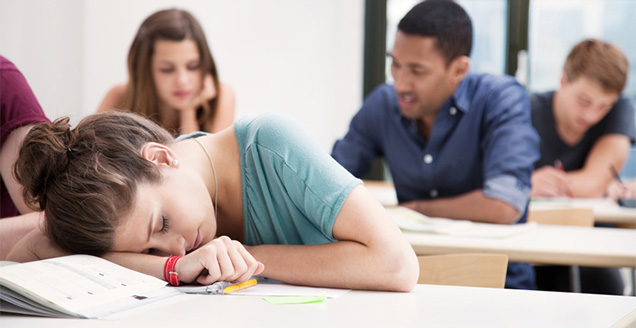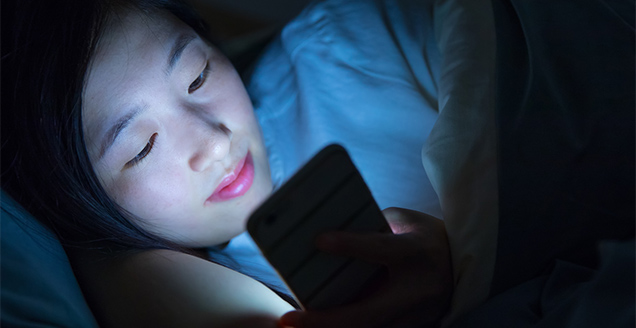Author: Clare Bruce | Open House.
When a teenager is rebellious, over-emotional, struggling at school, anxious or depressed, the cause may be as simple as a chronic lack of sleep.
Sleep deprivation can cause serious behavioural disorders in young people, and at times leads to a misdiagnosis of mental illness. But adjusting the teenager’s lifestyle and sleeping patterns, can lead to a dramatic turnaround.
Dr Chris Seton, a specialist from SleepShack and Westmead Children’s Hospital, says the importance of sleep shouldn’t be underestimated.
The Negative Effects of Sleep Deprivation

The outcomes of sleep deprivation are many, ranging from bad moods and depression, to risky behaviour, and a struggle to learn. Teens who lack sleep may even struggle to reach their full potential at school.
“One of the functions of sleep is to file memories into long term storage,” Dr Seton told Open House’s Stephen O’Doherty. “So you really need sleep to consolidate learning. Teachers say a lot of their tired kids don’t absorb information that well.
One boy treated for sleep deprivation was so badly affected, that he had firebombed his teacher’s car.
“And if you’ve got a predisposition to depression, the two things that will bring out your depression are stress and poor sleep. If you put those things together it’s a real time bomb. We see this a lot in our kids coming up to the HSC. They might have a genetic vulnerability to a mood disorder, they get stressed by their exams coming up, they sleep less because they’ve got to study more, and this is a toxic mix.”
Experts believe sleep deprivation affects boys in the area of the brain that controls good decision making (the pre-frontal cortex), while in girls it affects the amigdala, their emotional controller.
That’s why boys who are sleep deprived tend to engage in risky behaviour, while girls become more emotional. In fact one boy treated by Dr Seton was so badly affected by his lack of sleep, that he had firebombed his teacher’s car.
When he was treated, though, and established healthier sleep patterns, he became “the nicest kid”.
Mobile Phones are Keeping Teens from Sleeping

Technology is one of the big causes of sleep deprivation, which has doubled in the last 10 years and now affects 70 per cent of teenagers. Dr Seton says addictive mobile devices, and FOMO, the ‘Fear of Missing Out’, are a big factor.
“Technology is affecting our young people in a really big way,” he said. “The main reason is the increasing use of screens at night, and the screens have become more portable. Kids are using them in the bedroom.
“If you’re not socially connected all night every night, then you may be missing out on important social information and then you may be stigmatised for not knowing that information the next day.”
He adds that the blue light used to make mobile smart phones and tablets display images clearly, is the same light that keeps us awake.
“It’s the light spectrum that’s worst for your sleep,” he said. “When you’re exposed to blue light, your brain gets the message that it’s daytime, and reduces the production of your sleep hormone, melatonin. The brain gets conditioned to be more and more wakeful at night because of these neurochemicals.
“Also kids are more likely to use them in bed, so even when the kids stop their screens, their brain may be conditioned or trained to lie awake.”
Help is at Hand for the Sleep Deprived
For teens who are stuck in their unhealthy patterns, it may take a team of specialists to make a difference.
Sleep doctors and psychologists can help teens to see how their sleep patterns are affecting their health, and motivate them to take steps to change. Specialists will also help advise parents on what to do.
“Teenagers are really poor managers of sleep,” Dr Seton said. “They’re like toddlers. In general they won’t manage their own sleep, so their parents need to jump in and help. A lot of our work is talking to parents about how to negotiate this difficult process.”
Approaches include conducting a sleep study, face-to-face therapy, and online programs such as SleepShack. Some families will also use tools that enforce internet curfews.
“Sometimes the threat of (internet controls) can tease a teenager into better sleep behaviour, because they don’t really want their parents to control totally their screen behaviour,” Dr Seton said.
Listen: Sleep doctor, Dr Chris Seton, chats to Stephen O’Doherty on the effects of sleep deprivation.
Article supplied with thanks to Open House.
